Note
I've seen you commenting about how Katara didn't care about Zuko dying by hypothermia in Southern Water Tribe, during Book One. However,she seemed legit worried/compassionate (from a safe distance) about Azula in Book Three. What do you think happened to make Katara more compassionate about such a powerful enemy?
Compassion comes with empathy, which comes from understanding.
Book 1 Katara didn’t know how to put herself into the shoes of her enemies, and had no reason reason why she would ever want to. Her world was divided neatly into good guys and bad guys. She was good. The jerk with the ponytail and the red uniform was bad, because THEY were all born evil and that was all there was to it. Also, the Avatar returned, and if he could only stop wanting to ride a giant fish for a moment, he would totally save the world.
But then Book 2-3 happened, Katara traveled, and the world was revealed to be much more complex than she ever imagined. Nothing was like as it seemed. The Earth Kingdom generals wanted to turn Aang into a weapon at whatever cost, Aang was the Avatar, but also just one kid with no End-the-war-right-now magic button, Ba Sing Se - the last true bastion of freedom - was ironically a giant prison.
Prince Jerkbender turned out to be an actual human being, who was missing his mum as badly as she was missing hers. Then he was a jerk again. His uncle saved her, even though she had ratted out his tea-shop. Friend or foe? The line was becoming more blurry.
Then Book3 Katara discovers the Fire Nation, which is full of normal, banal people. Some of them starve next to a stinky river and Katara can’t help herself, but care about them. The Fire Nation is not the land of faceless evil anymore.
But then something even more dramatic happens. Katara meets Hama and for the first time she’s confronted with pure evil within her own kind. She learns her truly tragic origin-story. How evil is not a linear progress, how villains are made.
The capacity of good and evil are inside everyone. And as Zuko returns, and tries so so hard to hold onto the light inside himself, Katara perhaps for the first time allows herself to go down and look at the darkness she bottled up and confront her own capacity for evil (and boy, there is rage inside her too, ready to turn her into the next Hama if she lets it).

She becomes Zuko’s friend, learns his backstory, his family, how he was raised - and she watches that utterly tragic and heartbreaking fight between Zuko and Azula. And Katara was going to do 100% anything she had to in order to save Zuko, but I think watching Azula in that state is still difficult - because now Katara understands that she probably wasn’t born like this. She gets the context. She knows that once she was just Zuko’s little sister, and they could have been a lot like Katara and Sokka had they been born into a different family. But they weren’t. And Azula grew up with Ozai for a father and despite all the worldly riches, no love or emotional support.
Azula’s fall is scary and unsettling, not because she’s evil embodied - but because she’s not. At the end of the day, she’s not that different from Zuko or Katara. And once you cut away the armor, the superiority, the confidence - Azula is just another screwed up kid who is hurting and is paying dearly not only for the choices she made herself, but choices made by others. Her innocence is another casualty of the war. And now, Katara doesn’t just see red uniforms, she sees people.
8K notes
·
View notes
Note
i was rewatching avatar and sokka and zuko's fight in the second episode… sokka is *literally* the only person defending the village. sokka is a CHILD who prepares for battle alone and stands on the wall alone. he is the only person between the fire nation and children&his grandmother&his sister. and sokka being overpowered is…played for laughs? this is a child doing the best he can to defend his family in an incredibly desperate attack and we're supposed to laugh at him for being beaten
Sokka’s situation is both portrayed seriously AND for laughs,and only in A:TLA could they pull off something like that so well. First, his “watchtower” is shown tobe a pathetic pile of snow (humorous), but when the hulking Fire Nation vesselcompletely destroys it, Sokka’s vulnerability—and that of his village—is onfull display.

Likewise, when Sokka and Zuko suit up in matching shots:


Themusic and the framing take it seriously. It’s a parallel, showing that thesetwo teenage boys, though on opposite sides of the war, really aren’t all thatdifferent. Sokka’s initial pose is also heroic:

However, when Zuko and his crew first step off the ship, Sokka iskicked to the frozen curb with a comedic expression:

Themusic turns serious again when the child urges him to show no fear:

Butthen lightens up as Zuko makes short work of Sokka’s staff.

Soit’s not that the scene is played all for laughs, but rather that it’szig-zagging back and forth between comedy and peril. On its face, this seems to be contradictory, but it’s actually sending us a very important message about the threat that Sokka is facing.
The points at which the comedic beats occur are not when Sokka is attacking Zuko or defending his village, butwhen Zuko is retaliating. Sokka may be the comic relief here, but it is Zuko’s actions that are being being played for laughs. Zuko is terrible, absolutely terrible at being a bad guy. His methods lack brutality and viciousness. He has no interest in killing Sokka, or inflicting any lasting harm on him. In fact, it’s not until Boomerang hits him on the head that thegloves come off, but when they do, Zuko himself becomes the butt of the joke.



Literally.
And the episode ends with Sokka getting his revenge:

This perfectly sets up Zuko in contrast to the other Fire Nation military, as someone whose heart is not really in the conquest. And in the very next episode, we see that the mammoth bulk of Zuko’s Fire Nation ship …

… isin fact an old clunker next to the top-of-the-line new models like Zhao’s.

It’snot Sokka’s courage that we’re not meant to take seriously. It’s Zuko’svillainy.
6K notes
·
View notes
Photo

look I REFUSE to believe this hasn’t been done before, but ive never SEEN it done, so here you go.
51K notes
·
View notes
Photo
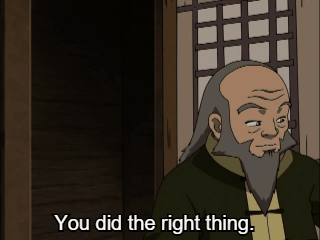
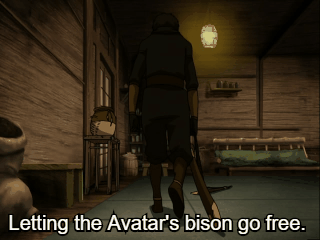
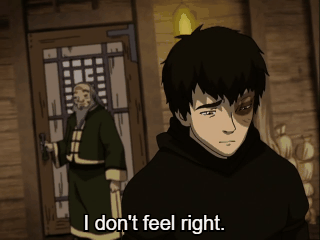
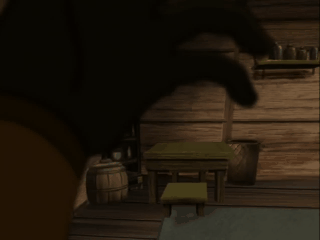
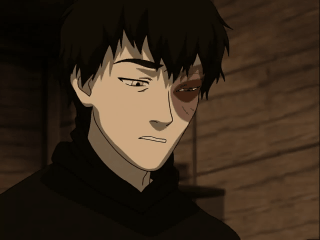
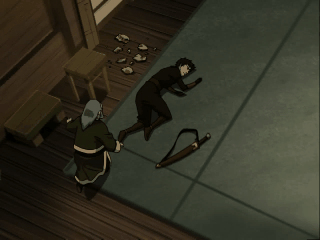
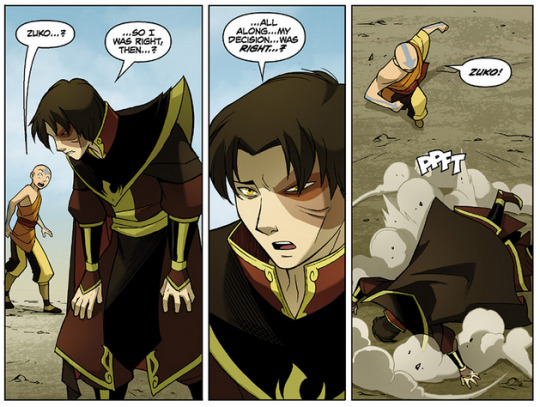
Zuko going into an angst coma because he made the right decision.
311K notes
·
View notes
Text
my sister said to me that she doesn’t think Azula would’ve killed Aang if not to bring Zuko home, and that made me realize something very interesting.
Azula doesn’t have a reason to want to capture Aang.
Not anymore than the rest of the Fire Nation. She wasn’t ordered to, but she was ordered to bring Zuko (and Iroh) home. Which she does, by killing Aang and giving Zuko the credit.
And you know what’s interesting? During the main four interactions Azula has with Aang during the second season, she sends Mai and Ty Lee away. She leaves them to fight Katara and Sokka, she leaves them to chase the bison she knows doesn’t have the Avatar, she fights him solo on the Drill and she leaves them to guard a bear and an empty throne while she takes on the Avatar in the catacombs.
She separates herself from them to fight Aang four different times.
From anyone else, it could be a pride thing. But Azula has shown on multiple occasions that she does not value pride above all else. She is insanely strategic, and she’s fine with making it look like someone else is winning if it means she has the upperhand. She admits when she needs help, hence having Mai and Ty Lee in the first place and Zuko in Ba Sing Se. She even apologizes to Ty Lee that one time. Azula does not value pride over results.
She doesn’t celebrate prematurely, either— during the Drill episode, she’s practically the only one who isn’t celebrating the victory. Azula doesn’t celebrate a victory until it’s final. Whereas Iroh in his flashback, a prideful man, had been boasting about burning Ba Sing Se to the ground.
Pride. It’s the food of the wise man, but the liquor of the fool.
It’s as if Azula is trying to capture/eliminate Aang specifically just to give Zuko the credit. The lack of witnesses, the way she seems to pursue the mission as a personal one. She intends to bring Zuko back to the Fire Nation as Ozai requested, but she intends to bring him back her way and get him unbanished.
#atla#azula#avatar: the last airbender#ow. azula loves zuko but is in a position where that love only Hurts/negatively impacts him
7K notes
·
View notes
Text
to me, the funniest thing about “that’s rough buddy” isn’t the fact that sokka says something patently insane with zero context seemingly out of nowhere, or the fact that zuko clearly doesn’t know how to respond. it’s the completely incorrect use of the word “buddy.” zuko would obviously like to be friends with sokka, but sokka is not, in fact, his friend. this is the most time they’ve ever spent together, and it’s because zuko invited himself to tag along on sokka’s suicide mission. at this point in the episode, sokka still hates this guy, perhaps less than he did a week ago, but he still hates him enough that he didn’t bother forcing zuko to stay home, which means he still didn’t really care whether or not zuko lives or dies. which, considering that he had tried to kill zuko multiple times in the past, is not all that surprising. this entire episode is essentially just zuko forcing his friendship onto sokka while sokka is legitimately too depressed to care. so when zuko calls sokka “buddy,” there’s a spirit of dogged optimism characterizing that epithet, because in no possible realm would sokka consider zuko his buddy at this point in the episode. and that’s something we miss when noting the iconicness of this exchange, simply because, by the end of this episode, they are buddies, so in our minds looking back on these lines, the implication of friendship doesn’t feel out of place at all. and really, it isn’t out of place, but only because zuko’s tenacity and determination (in this instance, his determination to befriend sokka) has always hugely outweighed his ability to read the room.
16K notes
·
View notes
Text
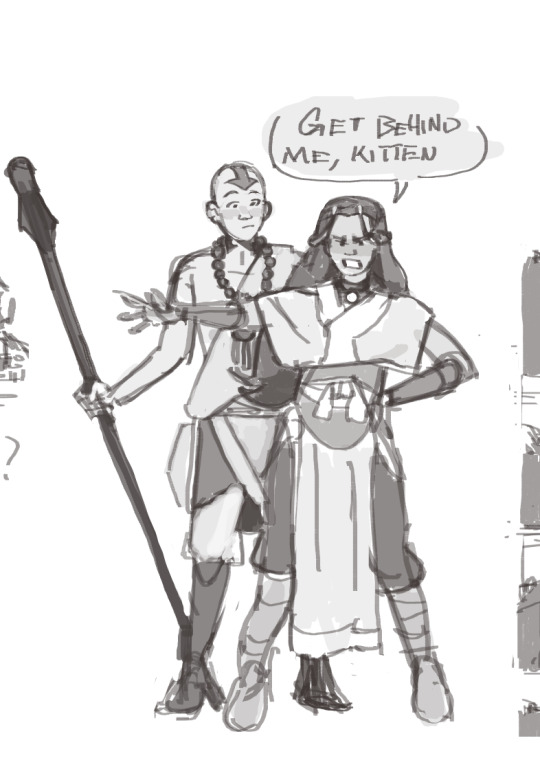

thinking abt this tweet again
35K notes
·
View notes
Text





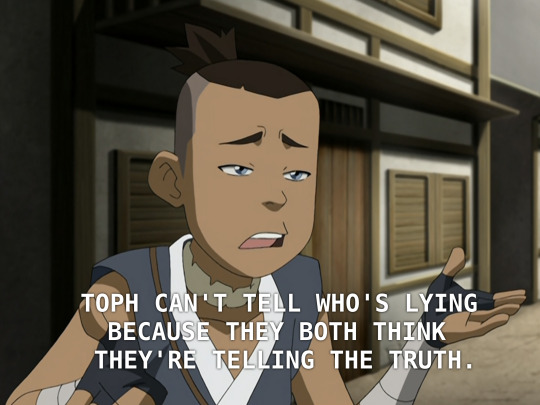






toph's seismic sense lie detection ability is very interesting to me, specifically as it's implemented in these two episodes. it's not that toph can discern what is ontologically "true," but that she can tell when someone thinks they're telling the truth versus when they're deliberately lying. so azula concocts what is obviously a blatant lie to demonstrate her proficiency in lying. except in doing so, she manages to game the system by establishing that what she is about to say is a lie, thus speaking “the truth.” if you preface a lie with the sentence "i am going to tell a lie," then there is no longer any of the implicit guilt – or ensuing "physical reaction" – attached to lying, because it is not the sentence itself being said, but rather the context surrounding the sentence that frames it as "a lie." so it no longer becomes a matter of whether azula can out-lie the human lie detector, but rather whether she can outwit toph.
338 notes
·
View notes
Text

How do we feel about Miku papyrus
12K notes
·
View notes
Text

My DnD bard, Skelton, who is definately not just sans in a funny hat.


5K notes
·
View notes
Text
Song: BRAIN - Kanaria
I added the music to his dancey dance :)
5K notes
·
View notes
Text




Papyrus content compilation from the newsletter for Papyrus lovers 💕
‼️‼️‼️AHHH
#the stimmies!!#and lol love how the first letter is just a note to sans#gosh i love him#si silly#papyrus#undertale
1K notes
·
View notes
Text
youtube
HAPPY 9th ANNIVERSARY UNDERTALE!!!
I’ve been working on this for the past month I hope you all enjoy it!
255 notes
·
View notes
Text



Happy Pride Month! Today i offer you: aspec knights. Choose your fighter.
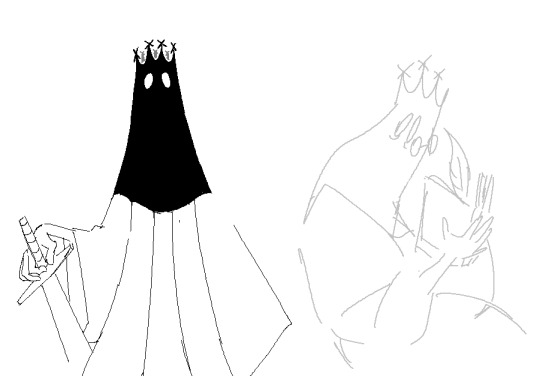
I also had idea for anattractional monarch but i never finished it
15K notes
·
View notes
Text

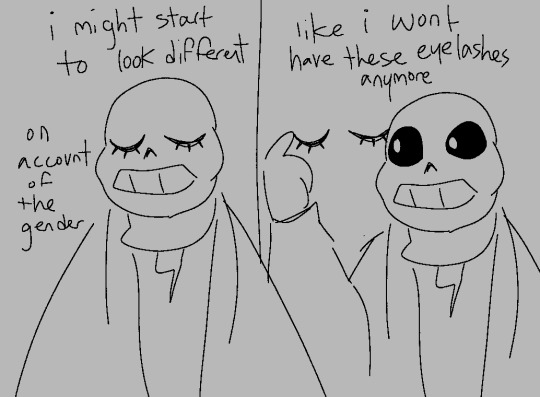
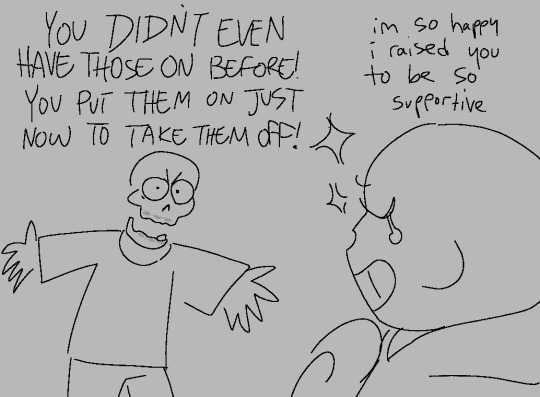
Sans' transition
10K notes
·
View notes
Text
Lights and Shadows of Cyber City.
39K notes
·
View notes
Text



You find information to tease your sibilings with, you HAVE to go and bug them with it, its the law
221 notes
·
View notes